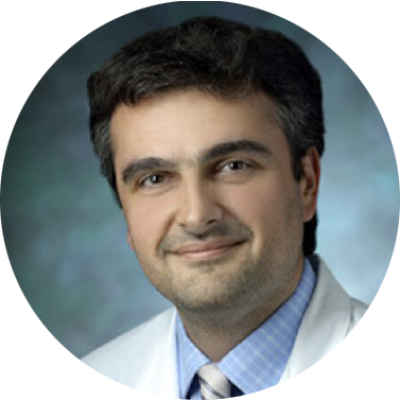
Dimitrios Mathios
I joined the cancer genomics lab led by Victor Velculescu and Rob Scharpf during my two years of research fellowship. During that time, my colleagues and I discovered and validated a new way to noninvasively diagnose patients with brain cancer and lung cancer via a blood test. This discovery is important as up until now, brain cancer could not be detected in the blood in the majority of the cases with any known methodologies. In lung cancer, we showed that detection at early stages is possible in a significant number of cases. Using our methodology, we were able to noninvasively subtype lung cancer into the two main categories: non-small cell versus small cell lung cancer.
Questions & Answers
Why did you choose Johns Hopkins for your work? Johns Hopkins has a tradition of excellent patient care and surgical innovation and a great track record of bench to bedside discoveries that have shaped the way medicine is practiced worldwide. What does receiving this award mean to you personally and professionally? Do you have any connection with the particular award you received? Receiving this award is humbling and a great honor for me. I am aspiring to be a surgeon-scientist, and having been recognized among the many excellent physician-scientists that do great work in their respective fields at Johns Hopkins gives me motivation to continue to think of new ways to bring fundamental biological discoveries closer to clinical practice, in parallel to the clinical and surgical duties I have toward my patients. What contributed to your project’s success? (Special skills, interests, opportunities, guidance, etc.) I think the success of the projects I worked on during my fellowship were a result of a combination of preparation, excellent mentors and collaborators, hard work, creative thinking and some luck. What thoughts do you have about Young Investigators’ Day itself, as a celebration of the roles students and fellows play in research at Hopkins? This is a great opportunity to showcase the achievements and progress that have been made across the medical campus in many different fields in science, and it gives a greater perspective on the mission of the Johns Hopkins school of medicine as an institution of medical innovation. What has been your best/most memorable experience while at Hopkins? I met my wife at Hopkins while we were working in the lab. Both of my children were born at The Johns Hopkins Hospital. All my adult happy moments have revolved around Hopkins. What are your plans over the next year or so? Graduating, looking for faculty positions, etc.? I will be completing my residency in a few months and will go on to do a surgical fellowship in skull base surgery at Weill Cornell. I am currently applying for faculty positions in neurosurgery. Tell me something interesting about yourself that makes you unique. Do you have any special hobbies, interests or life experiences? I grew up in a small town in Greece. My parents are olive farmers and I grew up helping them harvest olives when not in school. I moved to the U.S.A. after medical school to do translational research in cancer immunotherapy with no prior lab experience. My now wife, back then a lab technician, showed me for the first time how to use a pipette.